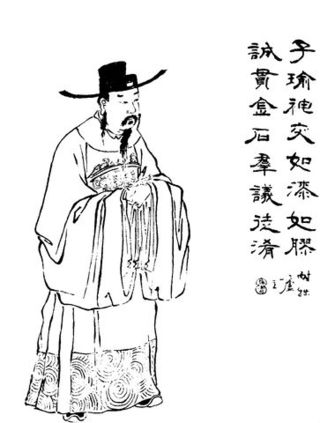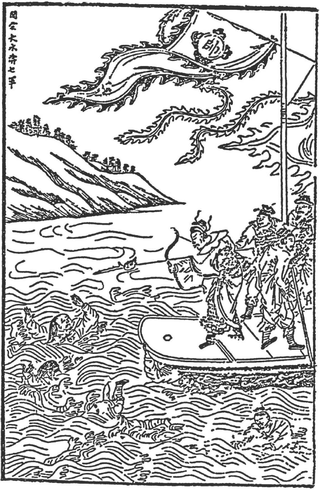Related Research Articles

Zhang Liao, courtesy name Wenyuan, was a Chinese military general serving under the warlord Cao Cao in the late Eastern Han dynasty of China. He served briefly in the state of Cao Wei, founded by Cao Cao's successor Cao Pi, in the early Three Kingdoms period before his death. Formerly a subordinate of other warlords such as Ding Yuan, Dong Zhuo and Lü Bu, Zhang Liao joined Cao Cao around 198 after Lü Bu's downfall at the Battle of Xiapi. Since then, he participated in many of Cao Cao's military campaigns, including those against Yuan Shao's heirs and the Wuhuan tribes from 201 to 207. He is best known for his pivotal role in the Battle of Xiaoyao Ford in 214–215, in which he successfully defended Hefei from the forces of the warlord Sun Quan.

The Battle of Xiaoting (猇亭之戰), also known as the Battle of Yiling and the Battle of Yiling and Xiaoting, was fought between the state of Shu and the state of Wu, between the years 221 and 222 in the early Three Kingdoms period of China. The battle is significant because Wu was able to turn the situation from a series of initial losses into a defensive stalemate, before proceeding to win a decisive victory over Shu. The Wu victory halted the Shu invasion and preceded the death of Liu Bei, Shu's founding emperor.

Zhou Yu (175–210), courtesy name Gongjin, was a Chinese military general and strategist serving under the warlord Sun Ce in the late Eastern Han dynasty of China. After Sun Ce died in the year 200, he continued serving under Sun Quan, Sun Ce's younger brother and successor. Zhou Yu is primarily known for his leading role in defeating the numerically superior forces of the northern warlord Cao Cao at the Battle of Red Cliffs in late 208, and again at the Battle of Jiangling in 209. Zhou Yu's victories served as the bedrock of Sun Quan's regime, which in 222 became Eastern Wu, one of the Three Kingdoms. Zhou Yu did not live to see Sun Quan's enthronement, however, as he died at the age of 35 in 210 while preparing to invade Yi Province. According to the Records of the Three Kingdoms, Zhou Yu was described as tall and handsome. He was also referred to as "Master Zhou". However, his popular moniker "Zhou the Beautiful Youth" does not appear in either the Records or the 14th-century historical novel Romance of the Three Kingdoms. Some Japanese writers such as Fumihiko Koide believe that this was a later invention by Japanese storytellers such as Eiji Yoshikawa.

Cao Ren, courtesy name Zixiao, was a military general serving during the late Eastern Han dynasty of China under the warlord Cao Cao, who was also his older second cousin. He continued serving in the state of Cao Wei – founded by Cao Cao's son and successor, Cao Pi – during the Three Kingdoms period. He played a significant part in assisting Cao Cao in the civil wars leading to the end of the Han dynasty. He was appointed as the Grand Marshal (大司馬) when Cao Pi ascended the throne, and was also credited by the latter for the establishment of Wei. However, Cao Ren was also once derided as a mediocre commander by Zhu Huan, a general from Wei's rival state Eastern Wu.

Zhuge Jin, courtesy name Ziyu, was a Chinese military general and politician of the state of Eastern Wu during the Three Kingdoms period of China. Born in the late Eastern Han dynasty, Zhuge Jin started his career in the 200s as an official under the warlord Sun Quan, who later became the founding emperor of Eastern Wu in the Three Kingdoms period. In 215, he served as Sun Quan's representative in a territorial dispute over southern Jing Province between Sun Quan and his ally, Liu Bei. In 219, he joined Sun Quan's general Lü Meng in an invasion of Liu Bei's territories in Jing Province after Sun Quan broke the Sun–Liu alliance. He was subsequently appointed as a general and commandery administrator. Before the Battle of Xiaoting of 221–222, Zhuge Jin attempted to dissuade Liu Bei from going to war with Sun Quan but was unsuccessful. The battle ultimately concluded with victory for Sun Quan's side; both sides made peace later and reestablished an alliance between the Eastern Wu and Shu Han states against their rival state, Cao Wei. From 222 until his death in 241, despite being rather incompetent in military affairs, Zhuge Jin served as one of Eastern Wu's top generals and participated in some battles against Cao Wei forces.

Guan Ping was a military general serving under the warlord Liu Bei during the late Eastern Han dynasty of China.

Yue Jin, courtesy name Wenqian, was a military general serving under the warlord Cao Cao in the late Eastern Han dynasty of China. He was noted as much for his short stature as for his valour and ferocity on the battlefield. Yue Jin participated in most of Cao Cao's early military exploits, and gained multiple successes in the campaigns against Lü Bu, Liu Bei, remnants of the Yellow Turban rebels, and Yuan Shao and his associates. He was particularly praised as a capable vanguard, but his most famed accomplishment came with his supporting role in the defence of Hefei against Sun Quan's forces at the Battle of Xiaoyao Ford of 214–215.
Li Dian, courtesy name Mancheng, was a Chinese military general and politician serving under the warlord Cao Cao during the late Eastern Han dynasty of China. He participated in the Battle of Guandu in 200 between Cao Cao and Yuan Shao. He also played a significant role in the defence of Hefei during the Battle of Xiaoyao Ford of 214–215 against the forces of Sun Quan.
Mi Fang, courtesy name Zifang, was a Chinese military general and politician serving under the warlord Liu Bei in the late Eastern Han dynasty. He was also the younger brother of Mi Zhu, who also served Liu Bei. In 219, Mi Fang surrendered to Liu Bei's ally-turned rival Sun Quan, directly resulting in the loss of Jing Province and the death of Guan Yu. The Australian Sinologist Rafe de Crespigny notes that Mi Fang had the remarkable record of serving each of the leaders of the Three Kingdoms during his lifetime.
Ling Tong (189–217), courtesy name Gongji, was a Chinese military general serving under the warlord Sun Quan during the late Eastern Han dynasty of China. He started his service under Sun Quan when he was still a teenager and, throughout his entire life, had been contributing to the foundation and solidification of the state of Eastern Wu, which Sun Quan established in 229. He fought in numerous battles for his lord, including those against Huang Zu, Liu Bei and the Shanyue tribes, but is best known for his performance in the campaigns against Sun Quan's archrival Cao Cao, in which he displayed great skill and tact in extremely adverse situations.
Huang Zu was a Chinese military general and politician during the late Eastern Han dynasty. He served as the Administrator of Jiangxia Commandery under Liu Biao, the Governor of Jing Province. He is best known for killing the warlord Sun Jian in an ambush during the Battle of Xiangyang (191) and resisting an invasion by the warlord Sun Quan at the Battle of Xiakou (203). He was defeated and killed at the Battle of Jiangxia in 208 against Sun Quan's forces.
Wen Ping, courtesy name Zhongye, was a military general who lived during the late Eastern Han dynasty and Three Kingdoms period of China. During his tenure as a general under the warlord Cao Cao, he was credited with defeating the enemy general Guan Yu and defending Cao Cao's interests in Jiangxia Commandery from the eastern warlord Sun Quan.

The Battle of Fancheng or the Battle of Fan Castle was fought between the warlords Liu Bei and Cao Cao in 219 in the late Eastern Han dynasty. It is named after Fancheng in present-day Xiangyang, Hubei, a fortress that played a significant role in the battle.
Pan Zhang, courtesy name Wengui, was a military general serving under the warlord Sun Quan during the late Eastern Han dynasty of China. He continued serving in the state of Eastern Wu during the Three Kingdoms period until his death. Pan Zhang was praised by Chen Shou as one of the "twelve tiger minister of Jiangdong" (江東十二虎臣).
Liu Fu, courtesy name Yuanying, was a Chinese politician of the Eastern Han dynasty of China. While serving as the governor of Yang Province from 200 to 208, he relocated the province's administrative centre from Liyang to Hefei. During his tenure, Hefei became a highly militarised and well-defended military stronghold, which later served as a strategic location in several battles between the rival states of Cao Wei and Eastern Wu during the Three Kingdoms period (220–280).

Lü Meng's invasion of Jing Province was fought between the warlords Sun Quan and Liu Bei in the winter of 219–220 in the late Eastern Han dynasty. Sun Quan's forces, led by Lü Meng, invaded Liu Bei's territories in southern Jing Province, which covered present-day Hubei and Hunan. The campaign occurred after the Battle of Fancheng and concluded with victory for Sun Quan's forces, who completely captured all of Liu Bei's territories. Guan Yu, Liu Bei's general guarding those territories, was captured and executed by Sun Quan's forces. The fall of Jing Province and Guan Yu's death provided the trigger for the Battle of Xiaoting between Liu Bei and Sun Quan between 221 and 222.
The Battle of Jiangling was fought by the allied forces of Sun Quan and Liu Bei against Cao Cao during the late Eastern Han dynasty of China. The battle was an integral part of the Red Cliffs campaign, and was fought immediately after the Battle of Yiling in 208, and the preceding engagement at Wulin on land and the marine Battle of Red Cliffs where Cao Cao's navy was destroyed. Note that the battle at Wulin was a byproduct of the Battle of Red Cliffs, and they were not the same battle.
The Battle of Xiaoyao Ford, also known as the Battle of Leisure Ford, Battle of Hefei, and Hefei Campaign, was fought between the warlords Cao Cao and Sun Quan between 214 and 215 in the late Eastern Han dynasty. The two contending sides were fighting for control over a strategic fortress at Hefei, which was defended by Cao Cao's general Zhang Liao. Towards the end of the campaign, Zhang Liao made use of force concentration and launched a sneak counteroffensive on Sun Quan at Leisure Ford, where Sun only had 1,000 soldiers with him at the time. Amidst the chaos, Sun Quan barely escaped capture with the aid of his general Ling Tong. This action raised Zhang Liao to primacy among Cao Cao's generals.
The Battle of Jiangling was fought between the forces of the Cao Wei and Eastern Wu dynasties in the early Three Kingdoms period of China. The battle, which took place around present-day Jiangling County, Hubei, was an integral part of the Wei emperor Cao Pi's three-pronged campaign against the Wu leader Sun Quan. It spanned a period of about six months from October 222 to April 223. Of the three fronts, the most critical Wei attacks were concentrated against the Wu fortress at Jiangling.
References
- Chen, Shou. Records of the Three Kingdoms (Sanguozhi).
- Luo, Guanzhong. Romance of the Three Kingdoms (Sanguo Yanyi).